

Thoreau's Civil Disobedience - with annotated text. 8, Ralph Ellison. When Invisible Man, Ralph Ellison’s first novel, received the National Book Award for 1953, the author in his acceptance speech noted with dismay and gratification the conferring of the award to what he called an “attempt at a major novel.”
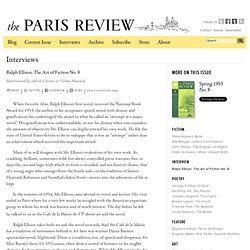
His gratification was understandable, so too his dismay when one considers the amount of objectivity Mr. Ellison can display toward his own work. He felt the state of United States fiction to be so unhappy that it was an “attempt” rather than an achievement which received the important award. Many of us will disagree with Mr. Ellison’s evaluation of his own work. In the summer of 1954, Mr.
Ralph Ellison takes both art and the novel seriously. Let me say right now that my book is not an autobiographical work. You weren’t thrown out of school like the boy in your novel? No. Why did you give up music and begin writing? I didn’t give up music, but I became interested in writing through incessant reading. But you went on writing— The Awakening. Conversion to TEI.2-conformant markup: University of Virginia Library Electronic Text Center. 310 kilobytes This version available from the University of Virginia Library.
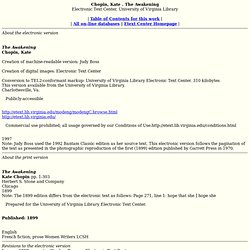
Charlottesville, Va. Commercial use prohibited; all usage governed by our Conditions of Use: The Awakening Kate Chopin pp. 1-303 Herbert S. Stone and Company Chicago 1899 Note: The 1899 edition differs from the electronic text as follows: Page 271, line 1: hope that she ] hope she Prepared for the University of Virginia Library Electronic Text Center. March 1999 corrector Elizabeth Styron, University of Virginia Electronic Text Center A green and yellow parrot, which hung in a cage outside the door, kept repeating over and over: He could speak a little Spanish, and also a language which nobody understood, unless it was the mocking-bird that hung on the other side of the door, whistling his fluty notes out upon the breeze with maddening persistence.
Mr. Mr. There was more noise than ever over at the house. Hemingway's Libidinous Feast - Christopher Hitchens. In a restored edition of a great classic, sexual anxiety looms large.
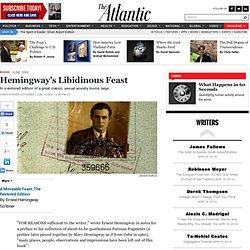
Lebrecht Authors A Moveable Feast: The Restored Edition By Ernest Hemingway Scribner "For reasons sufficient to the writer,” wrote Ernest Hemingway in notes for a preface to his collection of about-to-be-posthumous Parisian fragments (a preface later pieced together by Mary Hemingway as if from Cuba in 1960), “many places, people, observations and impressions have been left out of this book”: There is no mention of the Stade Anastasie where the boxers served as waiters at the tables set out under the trees and the ring was in the garden. Nor of training with Larry Gains, nor the great twenty-round fights at the Cirque d’Hiver. Eliot, T. S. 1922. The Waste Land.
Whitman's "Song of Myself" I CELEBRATE myself, and sing myself, And what I assume you shall assume, For every atom belonging to me as good belongs to you.
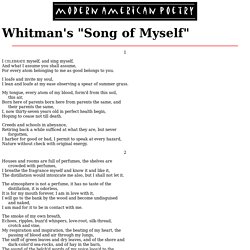
I loafe and invite my soul, I lean and loafe at my ease observing a spear of summer grass. My tongue, every atom of my blood, form'd from this soil, this air, Born here of parents born here from parents the same, and their parents the same, I, now thirty-seven years old in perfect health begin, Hoping to cease not till death. Creeds and schools in abeyance, Retiring back a while sufficed at what they are, but never forgotten, I harbor for good or bad, I permit to speak at every hazard, Nature without check with original energy. Houses and rooms are full of perfumes, the shelves are crowded with perfumes, I breathe the fragrance myself and know it and like it, The distillation would intoxicate me also, but I shall not let it.
Have you reckon'd a thousand acres much? Urge and urge and urge, Always the procreant urge of the world. A child said What is the grass? Smoke Signals Full Movie. Narrative of the Life of Frederick Douglass, an American Slave. Death of a Salesman play text. Dramatizing History in Arthur Miller's The Crucible. Activity 1.
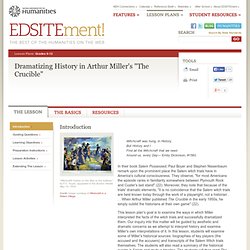
Historical Figures Research: Biography and Court Transcripts Having learned a little about the mindset of a seventeenth-century Puritan (see Preparing to Teach This Lesson for resources and ideas), students should choose one person from the following group of historical figures upon which to do research: Cotton MatherBridget BishopRev. Samuel ParrisJudge John HathorneTitubaAbigail WilliamsMercy LewisMary WarrenSarah GoodRebecca NurseJohn ProctorElizabeth ProctorMartha CoryGiles Cory Students will have in-class time to do Internet searches for their historical figure. For both the oral and written reports, biographical information may be found on any of the sites described in Preparing to Teach. Written Reports. What was your historical figure's social and economic status in the Salem community?
Oral Reports. Activity 2. As students read the 4 acts of The Crucible, they should keep a daily journal. Activity 3. Possibilities include: Activity 4. Activity 5.
Cool Stuff. Short Stories.